They’re Coming for Your Porn
MAGA and red-state America are giving new meaning to "No Nut November."
This post is by contributor Timothy Wood.
This election year, you’ve probably heard of Project 2025. If not, it’s basically a guidebook for creating a Christian Taliban, aimed at a second Trump administration, and crafted by a whole lot of people in Trump’s orbit — more than a hundred of them. Among many other things, the 900-page Heritage Foundation wish list calls for purging front-line government workers based on ideology, dismantling the Department of Education, and replacing swaths of career federal civil servants with political appointees. It proposes stripping legal protections for LGBT people, sabotaging the federal government’s ability to enforce civil rights law, and eliminating visas for victims of human trafficking in favor of allowing wealthy migrants to pay a premium to come to the US.
Project 2025 also calls for the criminalization of pornography, because nobody thinks about hot, sweaty sex more than ultra conservatives. The document reads:
“Their product is as addictive as any illicit drug and as psychologically destructive as any crime. Pornography should be outlawed.”
This ban would include anyone who produces and distributes pornographic material, including companies who simply host a website. It can also apply to your local school teacher or librarian who loans out a book with content someone finds objectionable. What does that actually mean? How do they define pornography? Who knows? Apparently even anatomical content can be considered pornographic by someone somewhere. The Supreme Court Justice Potter Stewart once defined pornography as “I know it when I see it.” If enacted, Project 2025 would effectively define porn as “anything that offends Christian theocrats and post-liberal weirdos” while handing them the big red verboten stamp.
This war against porn isn’t new. In fact, much of it has already gone into effect regardless of who wins on November 5th. At least 19 states have enacted porn identification laws, requiring users to upload a copy of their ID to access adult content. If that initially sounds like a good idea, consider for a moment the state of online data security. Let’s be clear, your online personal data has definitely been lost by somebody. If you haven’t gotten one of those data breach letters from an online service or employer, just sit tight, your day will come. Sooner or later, every porn site will be hacked, and the driver’s licenses of all their users will either become public information or a feeding frenzy for online blackmailers. I’m guessing that if you had to give people a choice between having their social security number or Internet search history leaked, a lot of folks are going to be conflicted.

Think about the most explicit thing you’ve ever looked up online. We all know it was 2 Girls 1 Cup, so let’s not pretend it isn’t (it’s a Wikipedia link, you pervert). Now imagine having to explain that in a job interview because it’s tied to your actual driver’s license. In response to these laws, some adult sites have simply blocked access in states with this requirement, in essence affecting a partial ban on access to porn, and leaving others open to legal action by the government.
To be sure, porn has its problems. It can be an exploitative industry, even to some of the big names your family members pretend they don’t recognize. As a society, we don’t want to talk about sex work as labor and the workers as people who have rights that should be defended and enforced. And nobody is particularly happy about the fact that many kids are learning about sex from watching porn.
In a country like the US, where the most sex education many receive is “just say no,” porn is the only sex ed they get. That can instill vastly unrealistic expectations. It’s like learning to drive by watching NASCAR and Formula 1. These are professionals. You can’t do what they do. So maybe we start with buckling your seat belt and using turn signals, because wearing protection and effectively communicating are important basics.
But these are less a failure of the porn industry and more a failure of society. In the history of humanity, simply telling someone not to do something, especially young people, has never had any effect other than sparking curiosity. We’re no longer in a world where you find your uncle’s Playboy collection in a box under the bed. Anyone with a phone can access explicit content pretty much anywhere at any time. The only thing anti-porn laws are going to do is teach a generation how to install a VPN or use encrypted chat while leaving grandpa exposed to blackmail and embarrassment.
Can porn be over the top? Sure. Porn is fantasy and it’s meant to be fantastical. Nobody wants to watch a movie where Superman has an uneventful day at work and then curls up with a good book and a warm blanket to decompress. Clark Wakes Up Early to Attend Yoga isn’t Zack Snyder’s best film. There isn’t really a genre of “college freshmen have an unfulfilling night”, “new parents are very tired but finally got the baby to sleep”, or “your actual grandparents keep their orthopedic shoes on when they have a go.” We want our entertainment to be larger than life, and that’s what we get.
These kinds of legal prohibitions, and those proposed in Project 2025, are, as with all puritanical impositions into people’s private lives, launched under the auspices of protecting children. But the way to protect minors isn’t to become the United States of Comstock; it’s to provide responsible and medically accurate sex education rather than letting them loose on the Internet as their only source of information. It’s time for parents to grow a pair and have candid conversations about sex with their kids. Use correct terms, tell them where an adult is not allowed to touch them, teach them how to use protection, instruct them how to say no, and prepare them for when they say yes — because that could be earlier than you think.
This is, of course, assuming that the protection of young people isn’t just a cynical excuse to empower a new morality police of authoritarian busybodies draped in American flags and yelling about personal freedom. Well guess what? If you can hand out rifles like candy — ones you probably don’t know how to shoot, much less disassemble and clean — then your neighbor can look at titties. Titties never killed anybody — and if they did, they’d instantly shoot to number one on the list of “preferred ways to die.” And to those who claim that porn is as addictive as drugs, either you have some remarkably good porn or some really shitty cocaine.
I have a genuine admiration for the conservative ideal of personal liberty. I just need a little convincing that the folks who call themselves conservatives actually take it seriously. If you believe in personal liberty, it applies even in cases you might find personally offensive. It applies even to choices we wouldn’t make ourselves, or in the case of porn, probably something a lot of people are doing anyway even if they won’t admit it. You can be a theocrat, or you can stand for freedom and liberty. You can’t do both.
See also: “We All Live in the Truman Show Now”
Subscribe now and never miss a new post. You can also support the work on Patreon. Please consider sharing this article on your social networks, and hit the like button so more people can discover it. You can reach me at @AmericnDreaming on Twitter, or at AmericanDreaming08@Gmail.com.







Nicely written, although there seem to be several competing theses here.
I agree with you that the existing laws are probably counterproductive, but I don’t really know how else to address the problem, or even if it’s enough of a problem that it needs addressing.